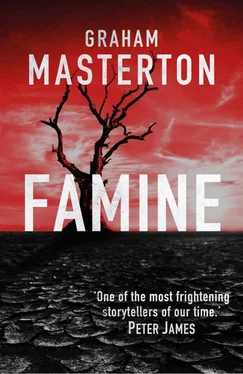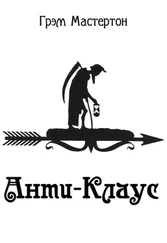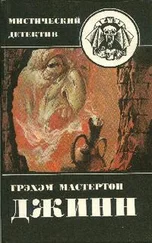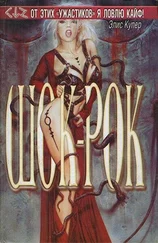Della raised one finger to her lips. ‘They call it “gaining essential access”. It’s only called “burglarisation” when you get caught, and the agency disowns you.’
She peered at the lock closely. ‘It’s nothing special,’ she told him. ‘A five-lever armour-plated deadlock.’
‘Is that all?’ asked Ed. ‘In that case, you should be able to open it with your hairgrip.’
‘Will you keep a look-out, and shut up, and trust me?’ hissed Della.
Ed waved a hand at her to calm her down. ‘Just open the door. I trust you.’
He kept a watch on the silent living area as Della worked at the lock. The polished tables, the empty chairs, the long-case clock that ticked away the small hours of the morning with tired reluctance. From where he was standing, he could see the stairs and most of the upper landing, too, and there was no sign yet that anybody was stirring. He looked at his watch and it was eleven minutes after two. He wondered why he felt so unreal, so detached from everything that was going on. Maybe it was this stylish and stylised house, with its Indian art treasures, and that indescribable aura of sheer wealth and political power which surrounded Shearson Jones. Maybe it was the terrible events of Sunday night, the looting and the burning – events which he felt responsible for starting, but which he had only been able to experience at second-hand, on television.
Another oddity, too, as far as his feelings of reality were concerned, was that the television news programmes kept informing him that ‘Kansas farmer Ed Hardesty, who publicly exposed the threat of a nationwide famine, is now in hiding in Washington, DC, along with Senator Shearson Jones, the man he claims is responsible for the crisis.’
The gates of Lake Vista had been firmly locked against the press since eleven o’clock Sunday evening, and two attempts by CBS News to land in the grounds by helicopter had been thwarted by Shearson’s yapping dogs and by the Muldoon brothers, waving scatter-guns and threatening all kinds of murder. Through his office in Washington, Shearson had announced that he was returning to the capital, in due course, and that he would make ‘a full and uninhibited statement’ later – but first he felt it his duty to make several ‘private and confidential’ visits to friends and political associates in Kansas. That had lent him the time to empty the Blight Crisis Appeal of anything that wasn’t nailed to the floor, while reassuring the President that he was quite prepared to return to Washington and face the music.
What Ed didn’t know was that Season had called Lake Vista five times during Sunday night and Monday morning, and that Willard Noakes had called, too, just to leave a message that ‘we’re right behind you, and if you need us, call.’
Della, wrestling with the door of Shearson’s study, said, ‘I can’t get to grips with this fucking lock. What the hell does he need with a five-lever deadlock?’
‘I thought you said it was easy,’ said Ed.
‘It should be,’ she told him, irritably. ‘It just so happens that it isn’t.’
‘Do you want me to try?’ Ed asked her.
‘Are you an FBI agent? Or a professional thief?’
‘No, I’m not.’
‘Well then, keep quiet, and let me get on with it.’
‘All right. I’m sorry. I was only offering to help.’
‘Don’t.’
Ed turned away from Della, and checked the living area again. It was 2:21 a.m., and the house was still silent. He thought he could hear someone snoring, but he couldn’t make out who it was.
The events of Sunday night had created an extraordinary kind of tension in the house. Ed had seen hardly anything of Karen since Sunday morning: Peter Kaiser had been keeping her away from anybody who might be considered an enemy of the Lake Vista establishment. Peter wasn’t sure yet if Karen had been responsible for tipping Ed off about the extent of the crop blight, but he wasn’t taking any chances. His mother had once told a new and rather sophisticated girlfriend of his that he had wept as a child in Bambi , especially in the scene where Bambi wanders through the fiery forest calling ‘Mother! Mother!’, and Peter had never trusted any woman since.
The tension had been heightened by Shearson’s silence. Instead of storming and raging about the house as Ed had expected him to, he had closeted himself away, and spoken to nobody but Peter and his servants. Several times during the day Ed had felt tempted to ask to talk to him, if only to clear the air. But Shearson had stayed out of sight. He wasn’t interested in Ed’s apologies, or explanations, or even his pledges to see Shearson roasting in hell. Shearson had several millions of dollars to rake off, and that was all that mattered.
‘That’s it,’ said Della, with surprising suddenness. Ed turned, and the door was already ajar.
‘You’re a genius,’ Ed told her. ‘A five-lever, armour-plated lock?’
‘They give us a pretty thorough training,’ Della explained, with unconvincing modesty.
‘You bet your investigative ass,’ said Ed, flippant, but also impressed. He’d tried to pick a padlock once, on Season’s diary, and he knew just how damned difficult lock-picking could be. He’d had to wait until Season had gotten around to telling him about her affair with Clive Harris of her own accord, and by then he hadn’t been really interested any more.
‘Come on,’ whispered Della. ‘And make sure you close the door behind you.’
They stepped into the office. It smelled of wine and cigar-smoke, and Shearson’s underarm sweat. Della switched on the green glass desklamp, and directed it away from the window, in case it cast any light across the gardens outside which could be seen from a balcony upstairs.
The wide oak desk was in chaos, heaped with scratch pads and graph paper and accounts books. It looked as if Shearson and Peter had finished their day’s work and then left everything exactly where it was, without bothering to clear up. There was even a half-smoked cigar in Shearson’s ashtray, and a congealing cup of coffee beside Peter’s chair. Ed picked up a yellow legal pad that Shearson had carelessly dropped on to the floor. On the top page, he had doodled an animated dollar-sign, with a broad smile, a big nose, and two little legs.
‘It seems like even dollars can walk,’ said Ed, throwing the pad down again.
‘Sure they can,’ said Della, who was busily leafing through the papers that Peter Kaiser had been working on. ‘They walk right out of the Blight Crisis Appeal fund, around the block a few times, double back around the next block, and then dodge in to Shearson Jones’s hank when nobody’s looking.’
‘I call that smart,’ said Ed.
‘I don’t,’ said Della. ‘I call it embezzlement.’
Ed looked around the office. The walls were clad with knotted pine, sanded and varnished. There were five or six photographs of Shearson making presentations to smiling wheat farmers in Kansas, and a misty early-American landscape by George Catlin. On the oak bookshelf beside the desk reclined a Victorian alabaster sculpture of an idealised Indian maiden, Pocahontas out of Wonder Woman, with feathers in her hair and bare breasts.
Della threw Ed a heavy pile of loose papers. ‘You can start on those. You’re looking for any financial movement out of the Blight Crisis Appeal fund. You’re looking for where it goes, who handles it, which banks are involved, account numbers, possible pseudonyms, that kind of thing. You’re looking for double entries and obvious laundering jobs. You think you can manage?’
‘Sure I can manage,’ said Ed, taking the papers across the room and spreading them out over a small side-table. ‘I mean, pinning down two expert embezzlers out of a whole mess of memos, that can’t be difficult.’
Читать дальше










